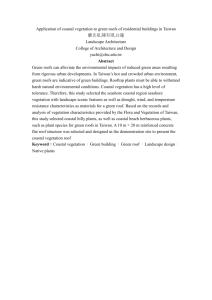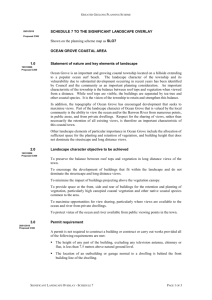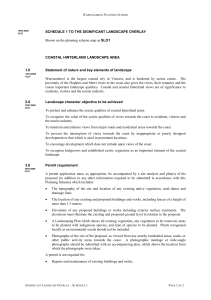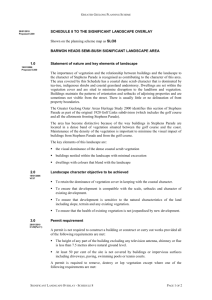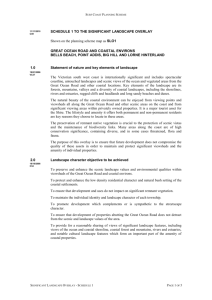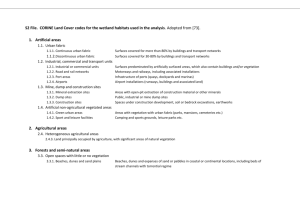42_03s02_moyn
advertisement
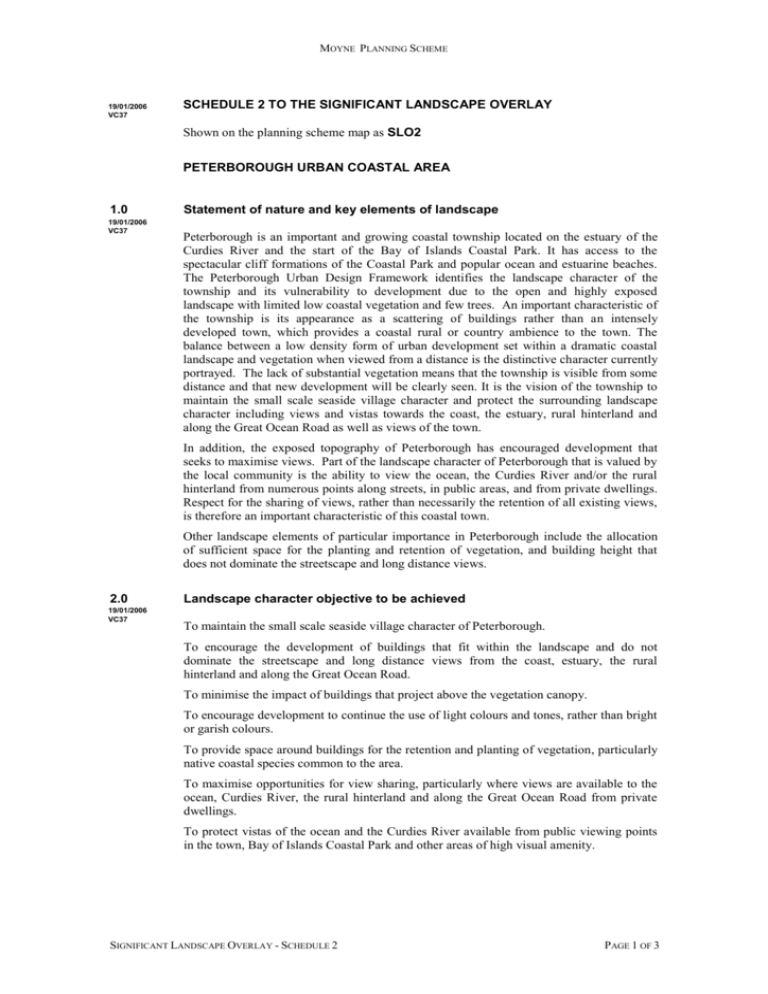
MOYNE PLANNING SCHEME 19/01/2006 VC37 SCHEDULE 2 TO THE SIGNIFICANT LANDSCAPE OVERLAY Shown on the planning scheme map as SLO2 PETERBOROUGH URBAN COASTAL AREA 1.0 19/01/2006 VC37 Statement of nature and key elements of landscape Peterborough is an important and growing coastal township located on the estuary of the Curdies River and the start of the Bay of Islands Coastal Park. It has access to the spectacular cliff formations of the Coastal Park and popular ocean and estuarine beaches. The Peterborough Urban Design Framework identifies the landscape character of the township and its vulnerability to development due to the open and highly exposed landscape with limited low coastal vegetation and few trees. An important characteristic of the township is its appearance as a scattering of buildings rather than an intensely developed town, which provides a coastal rural or country ambience to the town. The balance between a low density form of urban development set within a dramatic coastal landscape and vegetation when viewed from a distance is the distinctive character currently portrayed. The lack of substantial vegetation means that the township is visible from some distance and that new development will be clearly seen. It is the vision of the township to maintain the small scale seaside village character and protect the surrounding landscape character including views and vistas towards the coast, the estuary, rural hinterland and along the Great Ocean Road as well as views of the town. In addition, the exposed topography of Peterborough has encouraged development that seeks to maximise views. Part of the landscape character of Peterborough that is valued by the local community is the ability to view the ocean, the Curdies River and/or the rural hinterland from numerous points along streets, in public areas, and from private dwellings. Respect for the sharing of views, rather than necessarily the retention of all existing views, is therefore an important characteristic of this coastal town. Other landscape elements of particular importance in Peterborough include the allocation of sufficient space for the planting and retention of vegetation, and building height that does not dominate the streetscape and long distance views. 2.0 19/01/2006 VC37 Landscape character objective to be achieved To maintain the small scale seaside village character of Peterborough. To encourage the development of buildings that fit within the landscape and do not dominate the streetscape and long distance views from the coast, estuary, the rural hinterland and along the Great Ocean Road. To minimise the impact of buildings that project above the vegetation canopy. To encourage development to continue the use of light colours and tones, rather than bright or garish colours. To provide space around buildings for the retention and planting of vegetation, particularly native coastal species common to the area. To maximise opportunities for view sharing, particularly where views are available to the ocean, Curdies River, the rural hinterland and along the Great Ocean Road from private dwellings. To protect vistas of the ocean and the Curdies River available from public viewing points in the town, Bay of Islands Coastal Park and other areas of high visual amenity. SIGNIFICANT LANDSCAPE OVERLAY - SCHEDULE 2 PAGE 1 OF 3 MOYNE PLANNING SCHEME 3.0 Permit requirement 19/01/2006 VC37 A permit is required to remove, destroy or lop vegetation except where: The vegetation is recognised by the Department of Sustainability and Environment as an environmental weed. The vegetation is dead. Application Requirements An application for buildings and/or works must be accompanied by a Site Description and Design Response which must provide information on: Views obtained from neighbourhood dwellings or other habitable buildings across the site of the proposal to either the coast, coastal park, Curdies River, and/or rural hinterland. How the proposed development will ‘share’ existing views with adjacent dwellings. Where the proposed construction or extension of a building has the potential to be visible from a nearby beach and or visual amenity node, photographs, diagrams or similar documentation must be submitted to accurately demonstrate or capture the proposed structure as part of the visual landscape from these locations. The documentation must show that the development will not unduly impact upon vistas from the beach and other coastal areas including important visitor and tourism sites. An application for buildings and/or works, or to remove, destroy or lop vegetation, should be accompanied by a landscape plan that should incorporate the use of local indigenous species. 4.0 Decision guidelines 19/01/2006 VC37 Before deciding on an application the responsible authority must consider: Buildings and Works Whether the height of any part of the building, excluding any television antenna, chimney or flue, is less than 8 metres above natural ground level. Whether the location of an outbuilding normal to a dwelling is behind the front building line of the dwelling. Whether at least 45 per cent of the site is not covered by buildings or impervious surfaces including driveways, paving, swimming pools or tennis courts. Whether the external cladding or painting of a building other than for surface finishes is in light or pale colours and tones. Whether the siting and design of buildings achieves a reasonable sharing of views between properties with significant landscape features having particular regard to the following: The impact of the proposed buildings and works on the view from another property as a result of the design, siting, height, size, bulk (including the roof), and colour of the building. The opportunity for a reasonable sharing of views having regard to the extent of the available view(s) and the significance of the view(s) from the properties affected. SIGNIFICANT LANDSCAPE OVERLAY - SCHEDULE 2 PAGE 2 OF 3 MOYNE PLANNING SCHEME Whether the siting of buildings and availability of areas not covered by hard surfaces enables the retention of adequate vegetation and provides sufficient area for the planting of vegetation, particularly coastal native species that contributes to the overall character of Peterborough. Vegetation Whether the size, species, age and health of existing vegetation proposed to be removed, destroyed or lopped and the size, species and growth characteristics of any proposed replacement vegetation. The reasons for removing the tree and the practicalities of alternative options that do not require removal of any trees. The effect of constructing a building or constructing or carrying out works on the root system, canopy and overall appearance of any trees. The impact of a specified flood level on the overall height of a building. All applications The comments of an Urban Design Advisor or Urban Design Panel appointed by Council for any new development and for alterations and additions to existing and new commercial development including tourist accommodation proposed in prominent locations, (including sites adjacent to the Great Ocean Road, foreshore and coastal reserves and existing motel and hotel sites). The Peterborough Urban Design Framework Reference Documents Peterborough Urban Design Framework, 2002. Siting and Design Guidelines for Structures on the Victorian Coast, 1998. SIGNIFICANT LANDSCAPE OVERLAY - SCHEDULE 2 PAGE 3 OF 3
